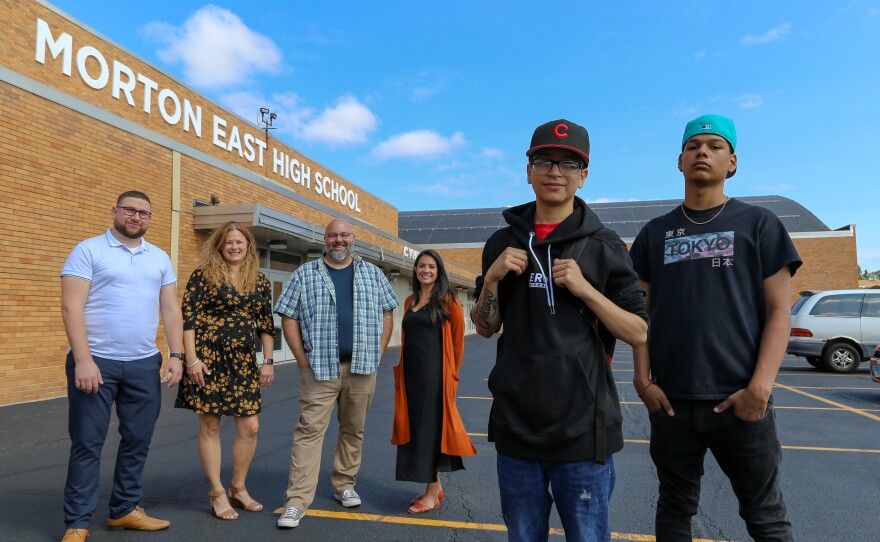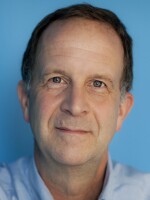It's that time of year again! Power up your smartphones and build your pillow forts, because we're about to open NPR's Student Podcast Challenge. Every year, we hear amazing student voices from around the country, and air the best student podcast entries on Morning Edition, All Things Considered, Code Switch, and other NPR programs.
The contest, which has drawn more than 40,000 students from around the country into audio storytelling, is back for it's fourth year: opening in December for college students and in January for grades 5-12. (For more information on the contest check out our website and subscribe to our newsletter.)
In judging these entries now for three years running, we've noticed that the names of certain schools, and certain teachers, keep showing up regularly. There's Stilwell High School in Stilwell, Okla., and the students in Faith Phillips' class. And Zehra Lakhani's class from Clearwater Fundamental Middle School, in Clearwater, Fla., who consistently have top contenders.
And then, there is the remarkable string of successful honorable mentions and finalists who hail from one high school in Cicero, Illinois.

And so, to kick off Year Four of the podcast challenge, we paid a visit to J. Sterling Morton East High School and met the team of winning teachers there to find out the secret sauce that makes podcasts by their students sizzle. It's a suburban school of 3,500 students just nine miles outside Chicago's city center.
Mark Sujak, Jeremy Robinson, Sophia Faridi and Sarah Lorraine are all veteran educators there — together they have almost four decades of teaching experience. With three finalists over the last two years and 5 to 15 honorable mentions every year, the school really packs a punch. Our NPR colleagues who screen the podcasts before handing off the finalists to the panel of judges know this school by name.
Bottom line: The students of these four teachers make great podcasts!
So, what's their secret? They all say collaboration is key. These educators — three English teachers and one librarian — don't pretend to be experts at everything. They divvy up the work, and play to each other's strengths, during a two-day audio boot camp for their students each fall.
"Sarah is like our research queen, Sophia is like journalism and background research. I've dabbled with AV editing since I was like 17, so I can help with technical questions," Mark Sujak explains. "And Jeremy is our story master, so we just divide the [students] into four groups and give them lessons over two days."
Then, throughout the school year, they use podcasts in their classes to help the students get a feel for the medium. Listening to episodes from popular podcasts helps kids get ideas and model their own submissions.
That's how Julian Fausto and Eric Guadarrama's podcast "Teens and Ink," one of last year's finalists, started. Julian says he decided to look at the pros and cons of getting tattoos in high school after listening to The Nod episode "Drake and The Diaspora" in Mark Sujak's class.
Once students have an idea and start discussing their project, they have to pitch it to a panel of three people. It could be the principal, the school nurse and a maintenance worker, or a school counselor, a Spanish teacher and the front office receptionist. The teachers really wanted to get the whole school involved in this process. They modeled the process off of the TV show Shark Tank, and they say normally the process gets students' ideas more refined and overall in better shape to finish the project.
Last year, with almost everything at the school moved online, the four teachers had to change things around a bit. Students submitted video presentations for faculty to watch, and those educators would give video feedback on their own time.
The four teachers are gearing up to build podcasting into their classes this year, and we'll be looking out for great podcasts from their students... and thousands of others around the country!
Listen to more about the Cicero teachers on this week's episode of The Students' Podcast:
Some specifics:
So this year, like last year, we'll host two contests: the traditional Student Podcast Challenge with two categories: grades 5-8 and 9-12; and the College Podcast Challenge where all students, regardless of age, pursuing an associate's or bachelor's degree, can apply.
In both cases, the basics are pretty much the same: Students will create a podcast about a topic they want to explore — and, basically, that can be just about anything. In the past, we've had podcasts about climate change and racism and what it's like to be a kid. Entries about Tater Tots and video games and history and life in a pandemic, and whether skunks or hedgehogs make the best pets.
As in the past, entries from middle- and high-school students will come from a teacher or a student leader who's a grown-up. College students — as long as you're 18 years or older — can enter on their own.
The maximum length of podcasts is 8 minutes for both contests.
Entries for the College Podcast Challenge will open on Dec. 1, with a final deadline of Feb 28, 2022. For middle and high school students, entries will open on Jan. 1, and close on March 21.
So, students, we can't wait to hear from you: Put on your headphones, plug in your microphones, and start recording!!
Copyright 2021 NPR. To see more, visit https://www.npr.org. 9(MDAzMjM2NDYzMDEyMzc1Njk5NjAxNzY3OQ001))








